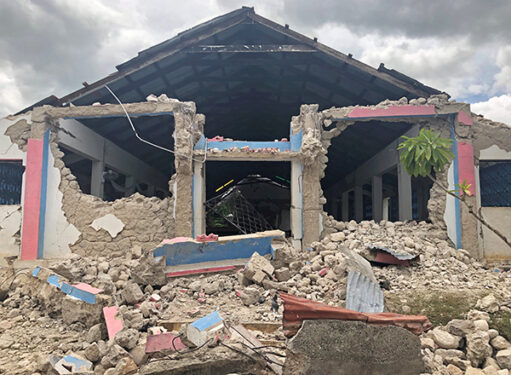
‘I don’t see anything we can do at the moment’
MIAMI — Marcus Garcia was about to record an editorial at his Port-au-Prince radio station on Jan. 12, 2010, when the ground began to shake. It stopped moments later. Having never experienced an earthquake before, he thought that was it.
“You take a breath, ‘thank God it’s over,’ and then the second movement started,” Garcia told The Tablet.
“The second movement was different. It was like a spinning top, and it was terrible because it destroyed everything around,” said Garcia, who has run the Mélodie FM radio station from Haiti and Miami for over two decades. “It seems to you that it lasts half an hour. You’re very surprised when you learn that it was less than a minute, but it was terrible.”
It would become one of the deadliest days in Haiti’s history.
Somehow, the Mélodie FM headquarters were unharmed by the earthquake, which sheltered Garcia and the others at the station from realizing the magnitude of the destruction all around. It wasn’t until they heard a “loud cry” that they rushed outside and saw buildings “crumbling down” and the “whole city covered in dust.”
Garcia then rushed home where he found his house destroyed and his wife underneath the rubble. He brought her to the hospital but it was too late; she had already died.
“It was terrible,” Garcia said.
Garcia remembers he then took his wife’s body to a safe place and returned to the radio station that was “miraculously” unharmed and still on air. They worked all night and for the next two days sharing the information of what happened. Because Mélodie FM was the only radio station in Port-au-Prince that wasn’t destroyed, Garcia believes he may have been the first person to share the news with those who didn’t know what happened.
Garcia said he will never forget the morning after, when they went out into the streets and realized the devastating death toll.
“After about 10-15 minutes the bodies were so many that you were surrounded by mountains of bodies all around the streets, all around the squares,” Garcia recalled.
There’s no telling what the state of Haiti would be today if the 2010 earthquake hadn’t happened, though history suggests it may not be much better. As Archbishop Thomas Wenski of Miami highlighted to The Tablet, “Haiti was in a bad way before the earthquake,” and that would likely be the case in 2022 even if it hadn’t happened.
“The earthquake was like a truck hitting somebody who was gravely sick,” Archbishop Wenski said. “It didn’t kill that person, because Haitians are very resilient, but had that truck never hit the person, would they still be in a bad way? And that would be yes.”
Garcia, though, holds that the dire situation of Haiti in 2022 has been exacerbated by what happened — mainly corruption — after the 2010 earthquake. By October 2010, $4.5 billion dollars was donated to Haiti for relief and recovery operations, according to the U.S. National Library of Medicine, but much of that was never used for its intended purpose.
“That changed everything. … Every [politician] was about to get their share of those billions,” Garcia said. “And so it seems, now, the country is poorer than ever before.”
In the past year, Haiti’s President Jovenel Moïse was assassinated and gangs have taken large portions of the country in the aftermath.
“Because there were U.S. interventions before, it seems like anything that happened there would be a U.S. intervention, but after the assassination, Biden said ‘no,’ ” Garcia said. “He said you have to do something by yourself, talking to the politicians, but they can’t. … They never try to find a solution by themselves.”
Garcia has been in Miami for the past three months for safety reasons, saying the situation now is worse than when he was exiled in 1980 by President Jean-Claude Duvalier. Garcia returned to Haiti after Duvalier was overthrown in 1986, and two years later, founded Mélodie FM, which broadcasts in both Miami and Haiti. Now, Garcia said he is soon going to return to Haiti to try and reinvigorate a sense of “community spirit” between Haitians in Haiti and in Miami over the radio airwaves. He admits that’s not going to solve Haiti’s problems by itself, adding that it’s so bad that “frankly, I don’t see anything we can do for the moment.”
Long term, however, he hopes bridging the gap between those in the states and those back home will make Haitians work together for change: “That’s what they should realize now. What is democracy? Democracy is working together.”
